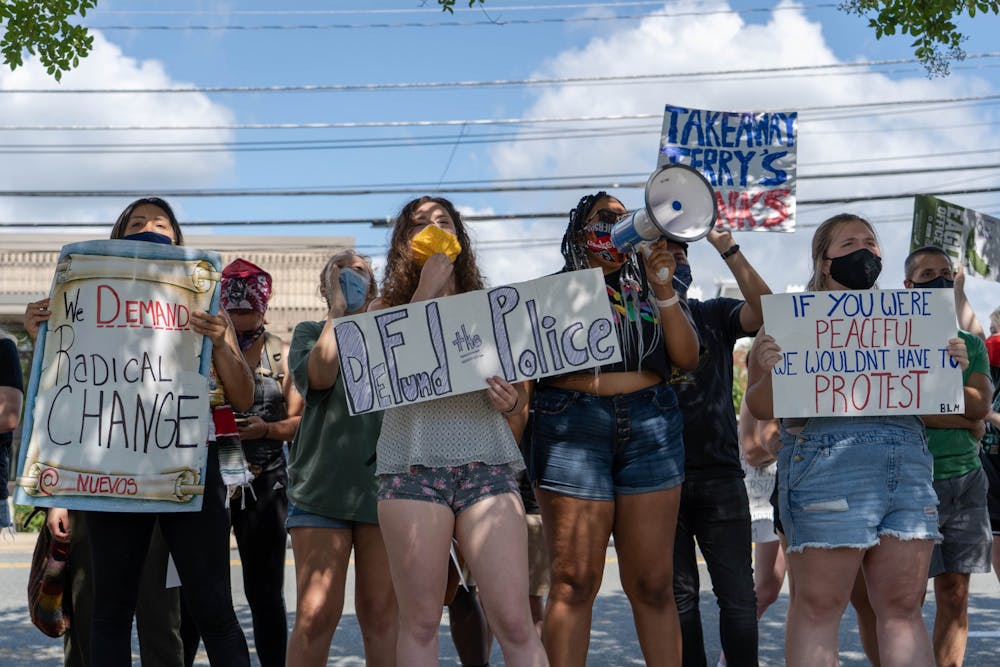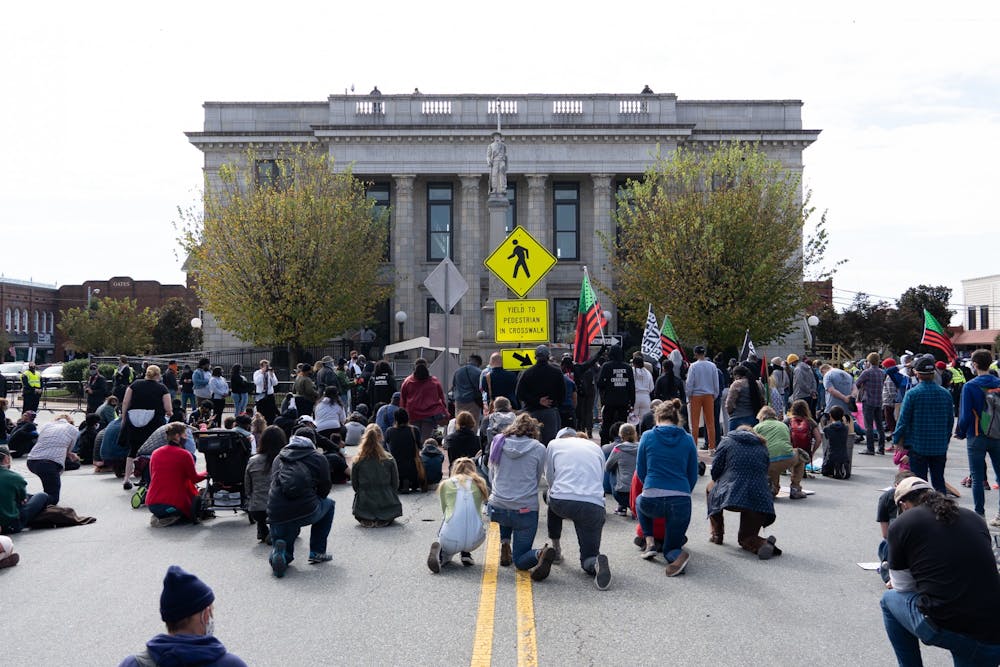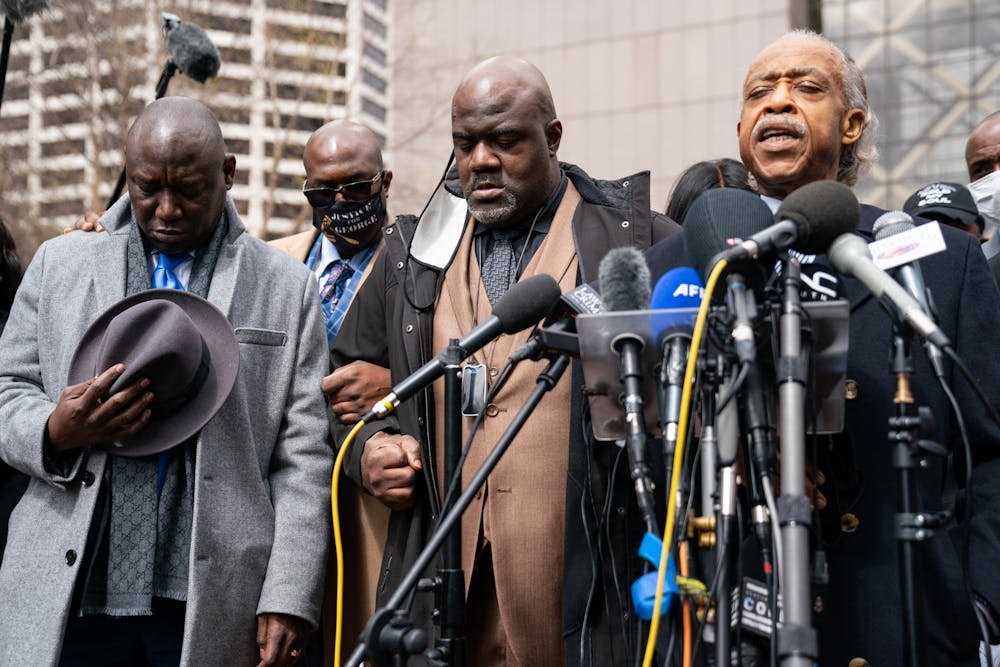Elon University sophomore Kennedy Boston sat by Lake Mary Nell watching a live stream recorded over 1,000 miles away in Minneapolis. She began crying after the verdict for George Floyd’s murder was announced.
“There was something so freeing in that moment of just like, we did it. Something's actually happening,” Boston said. “It's not really justice, justice would have looked a lot different, but it's still something.”
Derek Chauvin was found guilty of three charges for the murder of Floyd: second-degree unintentional murder, third-degree murder and second-degree manslaughter. Chauvin faces up to 40 years in prison, and his sentencing is expected in the next few weeks.
The former Minneapolis police officer knelt on Floyd’s neck for almost nine minutes as Floyd gasped for air, repeating “I can’t breathe.”
Following the verdict, Floyd’s brother Philonise Floyd said he and people around the world “were able to breathe again.”
“The whole world was seeing his life being extinguished and I could do nothing but watch, especially in that courtroom over and over and over again as my brother was murdered,” Floyd said in a press conference following the verdict.
For Boston, this was the culmination of months of protesting locally and activism. Boston herself protested in Alamance County and Graham over the summer.

Left to right: organizer of NueVoz advocacy group Carina Lozano, Elon sophomore and organizer Kasey Fountain, Elon sophomore and organizer Kennedy Boston, and Elon senior Nicole Schapowal gather in Graham, North Carolina to protest outside of the sheriff department for the right to protest and for Sheriff Terry Johnson to resign on July 9, 2020.
“The fact that it wasn't really the justice system that got this done, it was people keeping the pressure on it,” Boston said. “It feels good to know that not only did I have a part in that, but that's something that we did mattered.”
Standing behind Floyd and holding his shoulder was Burlington native, activist and Greensboro pastor Rev. Greg Drumwright. Drumwright has been in Minneapolis with the Floyd family throughout the trial. In a livestream on Facebook, Drumwright began to cry upon hearing the verdict.
“Our labor was not in vain … I’m thankful to God,” Drumwright said through tears. “Keep fighting.”
Following Floyd’s murder last year, Drumwright has been active in Alamance County, where he protests against police brutality and racial injustice at the Confederate monument in Graham. Drumwright was arrested for his involvement in leading a march to the polls rally in November.

Marchers at the I am Change March in Graham on Oct. 31, 2020, both stand and kneel for 8 minutes and 46 seconds in silence, the length of time that former police officer Derek Chauvin knelt on George Floyd’s neck and killed him.
Lawmakers across the country, and in multiple levels of government, have reacted to Chauvin’s murder verdict including North Carolina Gov. Roy Cooper.
“I appreciate the jury’s work for justice,” Cooper wrote in a Tweet. “George Floyd’s death shouldn’t have happened and we must continue to work to bring positive change to our state and country.”
President Joe Biden gave remarks on the verdict and recognized how "traumatic and exhausting" the trial was for individuals watching it unfold across the country.
"In order to deliver real change and reform, we can and we must do more to reduce the likelihood that tragedies like this will ever happen and occur again," Biden said. "To ensure that Black and brown people — or anyone — so they don’t fear the interactions with law enforcement, that they don’t have to wake up knowing that they can lose their very life in the course of just living their life."
Elon University President Connie Book released a statement following Chauvin’s conviction in recognition of how the trial has “deeply traumatized” members of the Elon community.
“It is a historic verdict in a case that tore at the fabric of our nation and starkly exposed the injustice faced by Black Americans and other marginalized people,” Book wrote. “This is a defining moment — an opportunity we must seize to make changes that are long overdue, including criminal justice reform.”
In her statement, Book recognized the need to address issues of equity in the university’s strategic plan, Boldly Elon, and the core curriculum. The university will hold an online panel April 28 at 7 p.m. to discuss race, policing and justice.
“Please join me in taking care of those who are hurting in our community from the impact of this case,” Book wrote. “Longstanding issues of injustice have affected many people close to us, and now is the time to stand with these members of our community and provide support and compassion.”
Elon freshman Britt Mobley was not following the trials because he had already assumed what the results would be.
“It's almost unbearable to handle because you sit and you have your predetermined notions of what happened and what has gone down and have your own decision that you want to happen,” Mobley said. “As a Black man, you don't have faith in the judiciary because every other time it hasn't been faithful to us.”
Mobley would still like to see reform in the judicial system.
“It has been far too long to where police officers are held accountable and there are laws that protect them from being held accountable,” Mobley said. “We saw this on video, all the proof is in front of us right, but there's a lot of instances in cases like Tamir Rice, Michael Brown, Trayvon Martin where they shouldn't have been killed.”


